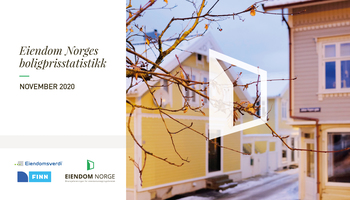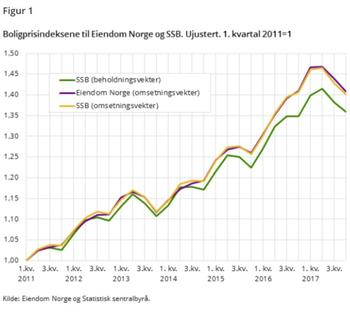
Strong rise in house prices in March
House prices rose by 0.9 per cent in March 2024. Adjusted for seasonal variations, house prices rose by 0.6 per cent.
So far in 2024, housing prices in Norway have risen by 5.9 per cent.
The average price for a home in Norway was NOK 4,581,993 at the end of March.
- House prices rose by 0.9 per cent in March, which gave a strong rise of 0.6 per cent seasonally adjusted. The strong development from the first two months of the year continued in March and exceeds what everyone envisioned at the beginning of the year, says CEO Henning Lauridsen of Eiendom Norge.
- At the start of 2024, many were concerned that the large offer in the second-hand housing market. In the first quarter of the year, the supply has been significantly reduced. This also applies to Bodø and Tromsø, where the number of unsold through the autumn of last year burst the curve, he says.
- The strong development in the housing market illustrates how quickly the housing market can turn around, both in terms of prices and volume. The housing market always surprises, says Lauridsen.
Volume drop before the spring flood
In March, 7,031 homes were sold in Norway, which is 20.1 percent fewer than the corresponding month in 2023.
So far this year, 20,687 homes have been sold in Norway, which is 8 percent fewer than in the same period in 2023.
In March, 8,621 homes were listed for sale in Norway, which is 1.0 per cent more than in the same month in 2023.
So far this year, 21,355 homes have been put up for sale in Norway, which is 0.5 per cent more than in the same period in 2023.
- Significantly fewer homes have been sold both in March and so far this year compared to last year, and as always the volumes in March and April must be seen in connection with when Easter falls, says Lauridsen.
- There has been an increase in the number of unsold in the last days of March, and we expect activity to pick up through April. The so-called spring flood in the housing market may come early this year, he says.
It took an average of 56 days to sell a home in March, down from 65 days in February. Oslo and Stavanger and surrounding areas had the shortest sales time with 31 days. Hamar m/Stange had the longest selling time with 112 days.
Differences in price trends
Bergen had the strongest seasonally adjusted price development in March, where prices rose by 1.9 per cent.
Kristiansand and its surroundings had the weakest seasonally adjusted price development in March, with a seasonally adjusted decrease of 0.6 per cent.
The strongest development so far in 2024 is Ålesund and its surroundings with 8.3 per cent. Trondheim has the weakest development so far this year, with an increase of 4.7 per cent.
- Although there are some regional differences, house price developments have generally been very strong so far this year. Usually, most of the house price growth during a year has come in the first half of the year and especially the first quarter. We expect a strong second-hand housing market going forward, but that the price trend will probably slow somewhat in the coming months, says Lauridsen.
Housing notice with paradoxes
Before Easter, the government presented its announced housing report to the Storting, where they address, among other things, the large drop in housing construction and the sharp rise in prices in the rental market.
- The government says that they want a better supply of rental housing and that the pressure in the rental market is creating more conflicts. At the same time, they pursue a tax policy to get fewer rental properties. Increased property tax on secondary housing affects tenants through higher rental prices and fewer rental offers, he says.
- The government will extend the start-up loan scheme to first-time buyers again after it was tightened in 2012. In practice, this is a circumvention of the government's own lending regulations. Here it would have been much wiser to repeal the lending regulations, which have both expired and prevent many from becoming home owners. The interest rate is no longer low and credit growth is not high, which was precisely a premise for the regulation.
- Many of the problems the housing report describes are precisely the result of the government's policy in other areas. We had expected the government to also address the paradoxes of a tax policy and credit regulation that both make it more difficult to rent a home and to become a home owner, concludes Lauridsen.





